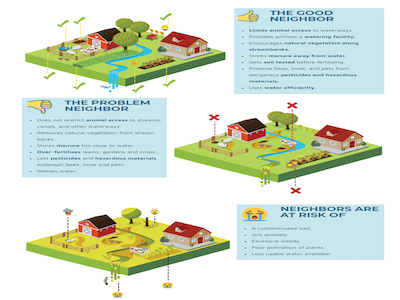As Interest in Local Food Grows, Water Pollution Shouldn’t

Place caption here
As a result of recent events, including the earthquake and coronavirus pandemic, more Utahns than ever are interested in growing and producing their own food. While this is a great opportunity to become sustainable, it should not happen at the cost of Utah’s water quality. The Utah Water Quality Task Force launched a small farms water quality website, DontShare.Utah.Gov, today to help small farms avoid actions that harm neighbors downstream and Utah’s water quality in general.
DontShare.Utah.Gov has best practices for manure management, pesticide application, fertilization and many other challenges small farms face. These practices can help new farms get a positive start and established farms improve their impact on water quality.
“There are simple changes that make a big difference,” said Jim Bowcutt, Utah Division of Water Quality environmental scientist. “We hope Utahns will take the small steps that make a big difference in water quality.”
As part of the effort, the task force spatially analyzed soil samples submitted to the Utah State University Soil Lab and found that phosphorus, the most common ingredient in many fertilizers, was often high.
“We visualized nutrient data from soil samples submitted from all around the state,” said Nancy Mesner, USU Extension water quality specialist. “Many regions are showing phosphorus levels over 25 times higher than what is recommended for healthy plants. These unused nutrients are carried by irrigation or rain runoff into our surface waters. Just like we shouldn’t share chewing gum, we shouldn’t share water pollution.”
The Utah Water Quality Task Force will publicize the Don’t Share website and associated water quality education campaign via social media, agricultural organizations and other advertising.
Contact: Nancy Mesner, 435-797-7541, nancy.mesner@usu.edu


 Utah 4-H & Youth
Utah 4-H & Youth